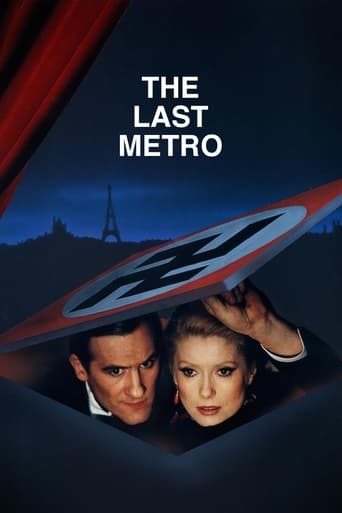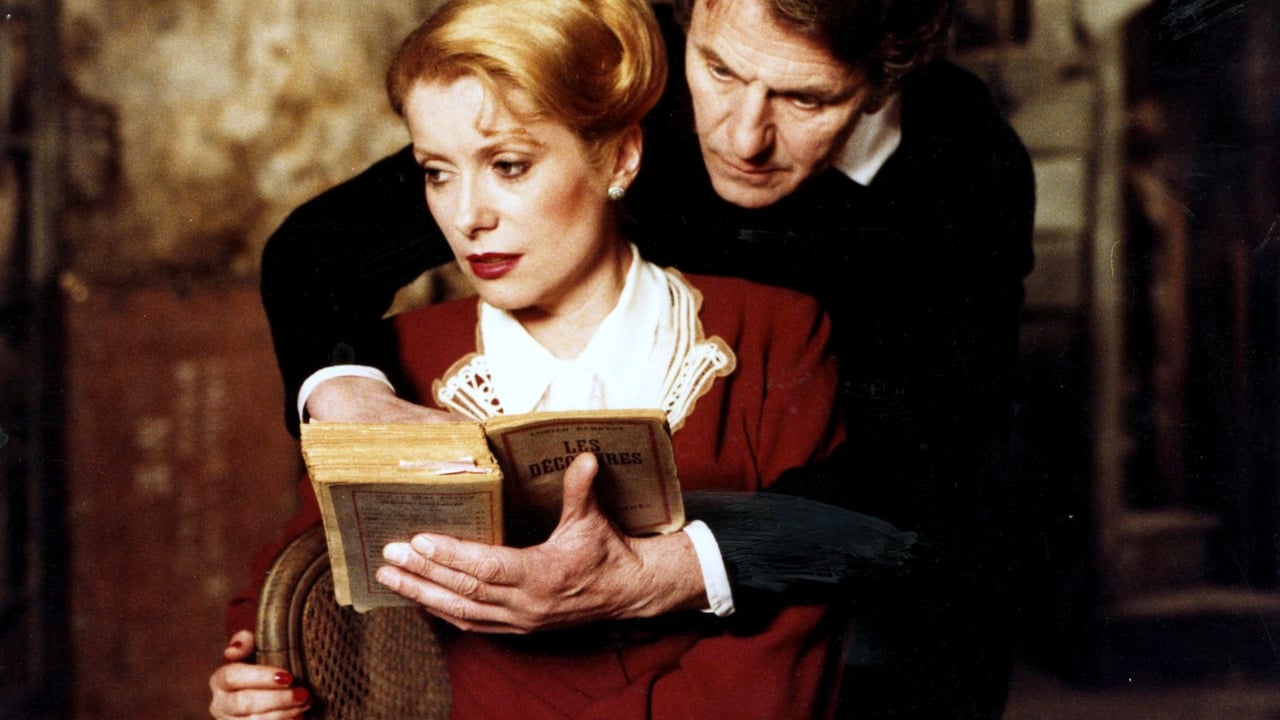leethomas-11621
An almost perfect movie. Great screenplay and actors. The two stars are mesmerising.
JoeKulik
The Last Metro is really a pretty good film, especially considering some of the real stinkers that Truffaut tossed our way during his directorial career.All the physical elements of the film were superb. Excellent costumes. Excellent recreation of WWII Paris. Excellent period props.The acting by the whole cast was really good.The film displayed a subtle, yet well defined interaction of motivations between the characters. This is particularly significant since the setting of the film is in German occupied Paris during WWII, when Frenchmen didn't really know who they could trust.The lighting & the cinematography was very good, considering that the claustrophobic scene settings didn't allow for long shots or much opportunity for innovative camera maneuvers.In short, this is one film by Truffaut that comes close to justify the legendary lionization that he really doesn't deserve.
jotix100
Even though we are led to believe the film is about the insanity of what Paris was experiencing during the dark days of the German invasion during WWII, in reality is is a work about survival in what these characters we are presented loved most, their beloved theater, now going through hard times because of what was going on all around them.Marion Steiner, a star on her own, has to manage the theater founded by her husband Lucas Steiner, when he flees the country. Being a Jew, he runs a risk of being sent to one of the concentration camps where most of them would die. By pretending he has left to South America, Marion and Lucas' assistant Jean-Loup are presenting a new Norwegian play that would have been Lucas' last directorial venture. The title of the piece, "Disappearance" was in reality written by Steiner and it has a hidden meaning that is only known to his wife.The young Bernard Granger, an actor that was last seen at the Grand Guignol, is engaged to play opposite Marion. Earlier, Bernard has tried to hit on Arlette, whom unknown to him, is the costume designer for the play. Bernard is not aware, or naive not to realize Arlette is a lesbian who cares much more for the ingenue of the piece, Nadine. The company enters the rehearsal period led by Jean-Loup. What no one suspects is that Lucas Steiner is living in the basement of the theater, where Marion goes on a nightly basis for guidance as to how the work progresses as well as for having normal marital relations and to tend for Lucas. The director figures a way where he will be able to follow all what goes on on stage by listening through an air vent that tells him what works and what must be changed.A anti-Semitic critic Daxiat, suspects something is not quite what he sees as he comes, from time to time, to watch what Marion Steiner is doing with the play. Jean-Loup tries to play both ways and tries to be on Daxiat's esteem so the play can get its due. The critic, though, has other ideas, which come clashing with what Marion is trying to do. He even hints that Lucas Steiner is still in France for there is no record of his departure.As the play begins, Bernard realizes he has feelings for Marion, something she clearly rejects. Marion does not encourage the young actor to be anything else, but her co-star. One gets the current between them as they continue to work together. Will what Bernard feels for Marion be returned? What with Lucas Steiner so close? The ending is a bit of a disappointment, and somewhat contrived.Francois Truffaut set his story during WWII, but it actually does not touch too deeply into the conflict itself. It is more about keeping the facade in the way the play is, rather than the menace from the invaders of France. It is a film within a film, a tribute perhaps to the resiliency of those performers that carried out entertaining the people that flocked the theaters, perhaps to keep themselves warm and sane. Truffaut was working with his usual collaborator, Suzanne Schiffman. Nestor Almendros photographed the production which is seen mainly in interior shots done in a studio and special set in an abandoned chocolate factory.Catherine Deneuve plays Marion Steiner with her usual reserve. Gerard Depardieu has some good moments with his Bernard. Andrea Ferreol's Arlette is perfect. Jean Poiret is seen as Jean-Loup, and Heinz Bennent plays Lucas Steiner.
FilmCriticLalitRao
It is a strange feeling to read that many critics do not consider "Le Dernier Métro" as one of Truffaut's best films.This is absurd as Monsieur Truffaut was a cinéaste who considered all his films as equal.One is not sure as to how some harsh critics have considered this film as one of Truffaut's commercial projects.The truth of the matter is that Truffaut had always wanted to make a film about Nazism as he had experienced this vicious phenomenon as a young boy.It must be made clear that Truffaut did not make "Le Dernier Métro" in order to please critics,well wishers and admirers.As we talk of this film,it must be stated that "Le Dernier Metro" is an equivocal title for a Truffaut film.It is a title which denotes danger,uncertainty and utter chaos.This is because if one misses the last metro train there would be nothing but unpredictable hopelessness.For denizens of Paris during Nazi occupation time there were good chances that the last metro could be missed by many people who stayed out late nights for theatrical performances.Although this is a film about an artistic "ménage à trois",Le Dernier Métro deals with hidden sexualities of its different characters. It also talks of a restrained love affair which is dwarfed due to two lovers' arrogance. German occupation of Paris is shown in a light tone as there are no scenes of atrocities perpetrated by German soldiers. In this film we get an idea of how artists (cinema and theater) behave in a given set up.It also depicts cold critics who are able of destroy not only somebody's career but also an entire theater production house.Among the actors Andréa Ferréol is at her sensual best.Jean Poiret looks sleek too. The best thing about this film is German actor Heinz Bennent's performance as Lucas Steiner,a theater director who is fed up of his isolation.His character is similar to that of Marnie,a role played by Tippi Hedren in Alfred Hitchcock's film "Marnie".


 AD
AD





